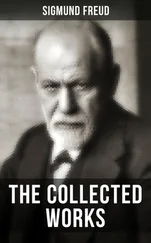I shall therefore cite some examples of dreams which I have gathered from children. A girl of nineteen months was made to go without food for a day because she had been sick in the morning, and, according to nurse, had made herself ill through eating strawberries. During the night, after her day of fasting, she was heard calling out her name during sleep, and adding: " Tawberry, eggs, pap ." She is dreaming that she is eating, and selects out of her menu exactly what she supposes she will not get much of just now.
The same kind of dream about a forbidden dish was that of a little boy of twenty–two months. The day before he was told to offer his uncle a present of a small basket of cherries, of which the child was, of course, only allowed one to taste. He woke up with the joyful news: "Hermann eaten up all the cherries."
A girl of three and a half years had made during the day a sea trip which was too short for her, and she cried when she had to get out of the boat. The next morning her story was that during the night she had been on the sea, thus continuing the interrupted trip.
A boy of five and a half years was not at all pleased with his party during a walk in the Dachstein region. Whenever a new peak came into sight he asked if that were the Dachstein, and, finally, refused to accompany the party to the waterfall. His behavior was ascribed to fatigue; but a better explanation was forthcoming when the next morning he told his dream: he had ascended the Dachstein . Obviously he expected the ascent of the Dachstein to be the object of the excursion, and was vexed by not getting a glimpse of the mountain. The dream gave him what the day had withheld. The dream of a girl of six was similar; her father had cut short the walk before reaching the promised objective on account of the lateness of the hour. On the way back she noticed a signpost giving the name of another place for excursions; her father promised to take her there also some other day. She greeted her father next day with the news that she had dreamt that her father had been with her to both places .
What is common in all these dreams is obvious. They completely satisfy wishes excited during the day which remain unrealized. They are simply and undisguisedly realizations of wishes.
The following child–dream, not quite understandable at first sight, is nothing else than a wish realized. On account of poliomyelitis a girl, not quite four years of age, was brought from the country into town, and remained over night with a childless aunt in a big—for her, naturally, huge—bed. The next morning she stated that she had dreamt that the bed was much too small for her, so that she could find no place in it . To explain this dream as a wish is easy when we remember that to be "big" is a frequently expressed wish of all children. The bigness of the bed reminded Miss Little–Would–be–Big only too forcibly of her smallness. This nasty situation became righted in her dream, and she grew so big that the bed now became too small for her.
Even when children's dreams are complicated and polished, their comprehension as a realization of desire is fairly evident. A boy of eight dreamt that he was being driven with Achilles in a war–chariot, guided by Diomedes. The day before he was assiduously reading about great heroes. It is easy to show that he took these heroes as his models, and regretted that he was not living in those days.
From this short collection a further characteristic of the dreams of children is manifest— their connection with the life of the day . The desires which are realized in these dreams are left over from the day or, as a rule, the day previous, and the feeling has become intently emphasized and fixed during the day thoughts. Accidental and indifferent matters, or what must appear so to the child, find no acceptance in the contents of the dream.
Innumerable instances of such dreams of the infantile type can be found among adults also, but, as mentioned, these are mostly exactly like the manifest content. Thus, a random selection of persons will generally respond to thirst at night–time with a dream about drinking, thus striving to get rid of the sensation and to let sleep continue. Many persons frequently have these comforting dreams before waking, just when they are called. They then dream that they are already up, that they are washing, or already in school, at the office, etc., where they ought to be at a given time. The night before an intended journey one not infrequently dreams that one has already arrived at the destination; before going to a play or to a party the dream not infrequently anticipates, in impatience, as it were, the expected pleasure. At other times the dream expresses the realization of the desire somewhat indirectly; some connection, some sequel must be known—the first step towards recognizing the desire. Thus, when a husband related to me the dream of his young wife, that her monthly period had begun, I had to bethink myself that the young wife would have expected a pregnancy if the period had been absent. The dream is then a sign of pregnancy. Its meaning is that it shows the wish realized that pregnancy should not occur just yet. Under unusual and extreme circumstances, these dreams of the infantile type become very frequent. The leader of a polar expedition tells us, for instance, that during the wintering amid the ice the crew, with their monotonous diet and slight rations, dreamt regularly, like children, of fine meals, of mountains of tobacco, and of home.
It is not uncommon that out of some long, complicated and intricate dream one specially lucid part stands out containing unmistakably the realization of a desire, but bound up with much unintelligible matter. On more frequently analyzing the seemingly more transparent dreams of adults, it is astonishing to discover that these are rarely as simple as the dreams of children, and that they cover another meaning beyond that of the realization of a wish.
It would certainly be a simple and convenient solution of the riddle if the work of analysis made it at all possible for us to trace the meaningless and intricate dreams of adults back to the infantile type, to the realization of some intensely experienced desire of the day. But there is no warrant for such an expectation. Their dreams are generally full of the most indifferent and bizarre matter, and no trace of the realization of the wish is to be found in their content.
Before leaving these infantile dreams, which are obviously unrealized desires, we must not fail to mention another chief characteristic of dreams, one that has been long noticed, and one which stands out most clearly in this class. I can replace any of these dreams by a phrase expressing a desire. If the sea trip had only lasted longer; if I were only washed and dressed; if I had only been allowed to keep the cherries instead of giving them to my uncle. But the dream gives something more than the choice, for here the desire is already realized; its realization is real and actual. The dream presentations consist chiefly, if not wholly, of scenes and mainly of visual sense images. Hence a kind of transformation is not entirely absent in this class of dreams, and this may be fairly designated as the dream work. An idea merely existing in the region of possibility is replaced by a vision of its accomplishment.
We are compelled to assume that such transformation of scene has also taken place in intricate dreams, though we do not know whether it has encountered any possible desire. The dream instanced at the commencement, which we analyzed somewhat thoroughly, did give us occasion in two places to suspect something of the kind. Analysis brought out that my wife was occupied with others at table, and that I did not like it; in the dream itself exactly the opposite occurs, for the person who replaces my wife gives me her undivided attention. But can one wish for anything pleasanter after a disagreeable incident than that the exact contrary should have occurred, just as the dream has it? The stinging thought in the analysis, that I have never had anything for nothing, is similarly connected with the woman's remark in the dream: "You have always had such beautiful eyes." Some portion of the opposition between the latent and manifest content of the dream must be therefore derived from the realization of a wish.
Читать дальше












